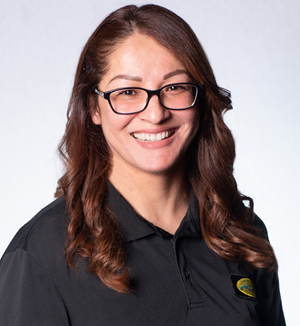When Sarah Velez was accepted into a sheet metal apprenticeship program 25 years ago, she was a single mother of five who had never used tools in her life.
“I needed a solid career, and I got it quick,” she says, relating that she learned about the industry from her ex-husband who was in the trades. She had a few months on an existing health insurance plan before she needed her own, and supporting a household requires steady, quality pay that jobs in retail or other industries just didn’t provide.
“My first boss was very kind and showed me how to do layouts, and that’s how I got started,” says Velez, now a foreman for Therma Mechanical based in San Jose, California, and works in the Intel building.
Two decades ago, a woman in the shop or field was rare. “There just weren’t as many of us,” Velez says, relating that her manager would purposely send her to sites where crews were lagging “to light a fire.” “If a woman was out there working, they tried to outwork me.”
Now, Velez says the environment is quite different — and, really, there has always been camaraderie and community, regardless of gender, that welcomed her as a driven worker.
“You can move up the ladder to any position you want,” Velez encourages. “Anything is possible.”
Connie Rivera is a testament to this. She joined the industry eight years ago at age 37 after re-evaluating her career. “I was stuck in retail with really no opportunity for advancement,” she says. She pivoted and decided to take classes to become a drug and alcohol counselor while also testing at Local 104 to earn a sheet metal apprenticeship.
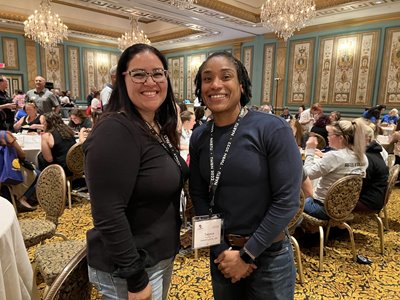 Turns out, Rivera came out top of the class: No. 9 out of 250, and she was signed up immediately and started a rewarding journey. Today, Rivera is a foreman at Western Allied Mechanical in Union City, California. She is passionate about training young people entering the field and attracting more women to the industry.
Turns out, Rivera came out top of the class: No. 9 out of 250, and she was signed up immediately and started a rewarding journey. Today, Rivera is a foreman at Western Allied Mechanical in Union City, California. She is passionate about training young people entering the field and attracting more women to the industry.
Rivera jokes, “Like I tell the girls, it’s sheet metal. It’s so easy that even a man can do it!
Though she acknowledges that old-school perceptions of construction as a man’s world simply aren’t the case, the relationships she built with her male colleagues — and women — ultimately resulted in the lead position she holds today.
“I want to inspire everyone,” Rivera says. “It’s a great opportunity and career for anyone if you have the motivation, will and drive.”
The Whys: Salary, Stability and Skills Training
On-the-job skills training and stability are a couple of reasons individuals join the sheet metal and air conditioning field. When surveyed by SMACNA, respondents overwhelmingly named health benefits, retirement, craft training and wages as drivers to pursue the work. And the financial rewards are a real draw, with 80.4% saying better pay is a motivating factor.
Christine Hess knows this firsthand. She was a dental assistant for 16 years and decided to make a change, encouraged by her husband who mentioned that the local sheet metal union was seeking CAD apprentices. “I knew what he was making as a member of Local 66 and I thought I would give it a try,” says Hess, a startup technician and journeyperson at Hermanson Co. in Kent, Washington.
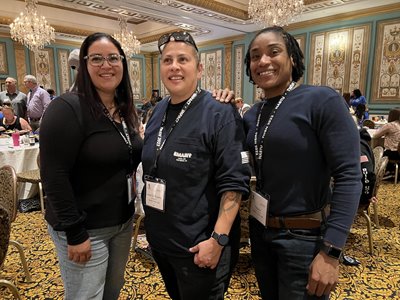 Hess appreciated opportunities to work on large building projects. “It’s neat to see how it is started and where it ends in the finished state,” she describes. “And I get to see all the different parts of buildings that I’d never seen before.” In fact, Hess worked at the Climate Pledge Arena in Seattle during its renovation.
Hess appreciated opportunities to work on large building projects. “It’s neat to see how it is started and where it ends in the finished state,” she describes. “And I get to see all the different parts of buildings that I’d never seen before.” In fact, Hess worked at the Climate Pledge Arena in Seattle during its renovation.
Hess tests, adjusts and balances HVAC equipment after installation to ensure it is working properly. And doing this, she earns nearly three times more than in her previous occupation.
“I went from working mostly with women to working mostly with men,” she points out, adding that the difference is mostly more down-to-business talk vs. chatting with the girls. At first, she felt intimidated in the field—but not for long. “There are definitely more women in the industry now and everyone has always been very helpful,” she says.
The flexibility to move up the ladder and serve in different roles is also attractive. “You don’t necessarily have to be on a job site,” Hess points out. “You can get into detailing where you are doing drawings. There are so many options.”
More women are recognizing the opportunities in sheet metal. However, the industry is still male -dominated, and as Rivera says upon seeing another female on a crew, “it was like a unicorn. It doesn’t happen every day.”
“Years ago, the mentality was that women couldn’t physically do it, and technology has changed that completely,” points out Julie Gue, a foreman with Duct Fabricators in Cleveland who works as an inspector mainly focused on fire dampers in Cuyahoga County’s buildings. “We have several women now who are breaking that stereotype.”
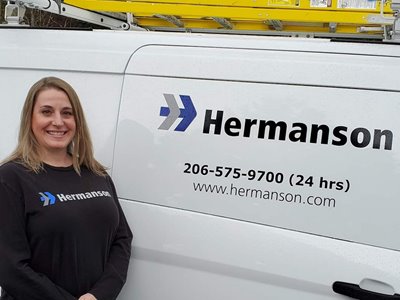
Christine Hess, a startup technician and journeyperson at Hermanson, enjoys working on large building projects.
Gue joined Local 33 in 1995 after working as a baggage handler for what was then Continental Airlines at the Cleveland Hopkins International Airport. “The airline was unpredictable and I was looking for a career where I would have a marketable skill, so I started looking into all of the trades,” she says.
The wife of one of her coworkers at the airline was, in fact, a plumber. He gave Gue an article about sheet metal apprenticeships and she admits, “I didn’t even know what sheet metal was.”
So, she dug into it, started an apprenticeship and never looked back. Like others, Gue says the skills, salary and stability were selling points.
“I enjoy traveling, and this career has afforded me the ability to see the world and own my own house as a single woman,” Gue says. “I have a pension and good health insurance, and I can support myself.”
Plus, Gue loves that every day is different on the job. “There is constant change, and even working in a fabrication shop every day, you’re not going to do the same thing. Every job is different, so you are making different components, or you could run a plasma table one day and weld the next. That was a big deal to me.”
Variety is a selling point of the industry that other women identify as a reason to get into the field. “My favorite part of the job is the daily challenges — every day is unpredictable and it allows me to work, coach, train and mentor with other coworkers as a team,” says Estela Recinos, an estimator and foreman at Acosta Sheet Metal Manufacturing in San Jose, California. “I also love to continue learning new things.”
Recinos started in the shipping department in 2013 after moving to the area, working her way up to inside sales. Six years ago, she transitioned into the shop and started really digging into the trade. “Because of my knowledge in the shop and estimating experience, I am also a foreman for our production team that specializes in residential and light commercial products,” she relates.
Because of the career path Recinos is on, she has built a better life for her family as a single mother, she says. “The sheet metal/HVAC industry is a great career for women, especially when considering the earnings and benefits that are available,” she adds.
“The opportunities for women are the same as for anyone else,” Recino points out, adding that she participates in events held for women in the industry sponsored by her union, Local 104. “I’m motivated to contribute and show that women can do this job, too.”
A Career Pathway to Journeyperson
While women are a minority in the industry, the equity of an apprenticeship system positions every individual on a level plane. Rivera makes a point to emphasize to all apprentices that there is a chart of pay rates based on your years in the apprenticeship program. “Everyone starts at a given wage and no one can take that away from you,” she says, adding that she often spots a glimmer in the eyes of females who, perhaps, have earned less than male counterparts in other jobs.
“Every raise you get is the same,” she continues. “At the end when you become a journeyperson, you are making the same as the guy next to you and every guy before you. The rate is right there, so it’s not a matter of your gender. All that matters is that you are a first-year, second-year and so on.”
Also, there is a structured process for attaining skills and achieving the journeyperson title. And it doesn’t matter who you are. “Initially, you make an appearance at the [local] hall and you begin the testing process,” Rivera explains. “Once you are done with the process of testing in for rankings, there is a wait period. The ranking tells where you are on the list and your chances of being called that year.”
As for Rivera’s apprenticeship, there were four six-month rotations and at the end, she could choose to return to a rotation, stay in the position or move to a different company. “My first rotation in the shop was amazing and they gave me so many opportunities to learn all the different equipment,” she relates.
At another company, Rivera apprenticed in the field. She’d finish her work efficiently and learn additional skills from others on the crew — all men — who took pride in helping her out. “They were available and willing and wanting to teach me, and I made some really great friendships that ultimately resulted in the job I have now,” she says.
Gue says a willingness to ask questions is important for any apprentice, and women should not feel intimidated. “You have to be really open to being mentored and coached,” she says. “And if you are working with a different journeyperson one day, your best option is to say, ‘This is what so-and-so taught me, do you have a different way?’ Usually, they are open to showing you their way, and then you learn more.”
Jennifer Scott began her career track as a pre-apprentice for 11 months, which meant making deliveries, wrapping or covering ductwork, and cleaning the shop among other duties. She then began rotations and eventually learned architectural sheet metal. “I love doing exposed ductwork that will be seen and you have to take your time with — I like pretty things, I don’t know how else to say it,” Scott quips, adding that she also learned a lot from her parents, who were sheet metal workers.
“When I was growing up, I would come home and see my mom working on down spouts or leader heads — it’s been in my family for so long,” says Scott, who is fourth generation. “My dad basically got the jobs and drew the pictures, and mom built whatever he drew.”
Going into a male-dominated industry never crossed Scott’s mind, having this experience at home. She decided to enter the trade after having a second child when she was going to recertify to get her EMT license. She already had the schooling. But she knew of the opportunities in sheet metal, and providing a stable and solid wage for her household was key.
“I want to go to the top,” she says, proud of her foreman title at Omni Sheet Metal in San Jose, California. Her only regret is not entering the trade sooner.
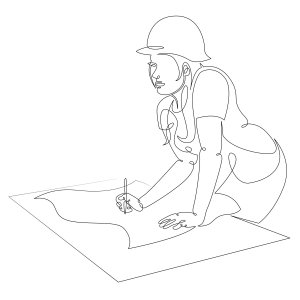 Velez adds, “It’s not about being a woman on the team — it’s about being a family member because this is a family. Being a woman will not get you up and down the ladder any faster. It’s your hard work. And, it is a good trade where women can advance.”
Velez adds, “It’s not about being a woman on the team — it’s about being a family member because this is a family. Being a woman will not get you up and down the ladder any faster. It’s your hard work. And, it is a good trade where women can advance.”
Casey Abbett also comes from a family of sheet metal workers and is a fifth-year apprentice at Cox Engineering in Randolph, Massachusetts. She is a CAD draftswoman and the fifth generation to enter the industry. “Because of my dad, I was able to easily read the prints,” she says. “As a child, I would help him highlight prints, so it came to me naturally.”
Previously, she worked in the field and as one of few women, “I find it empowering,” she says. “I do occasionally see other girls when I’m out in the field and there is a sort of camaraderie because there aren’t a lot of us. I always thought construction was a man’s job, but when I got into it, I realized not only could I do it, but I am pretty good at it.”
Now she is completing her experience through Local 17. Already, Abbett is enjoying the more consistent work schedule. She is now able to pick up her son from school and spend the evening hours with him. (The early morning hours do “take a village,” she admits, relating that family helps.)
Abbett adds, “I would not be able to make such a great living if I had not joined the sheet metal union.”
Welcoming Women
So, if there are significant opportunities for women in sheet metal, what are the barriers? What’s keeping more females from joining the ranks? Is it really that easy to enter and excel in a traditionally male-dominated industry?
For one, there are false perceptions about what field and shop work involves. “It might seem like it’s too dirty or heavy, but we have the equipment and means to make that easier and keep your body safe,” Rivera points out. “I have machines that lift everything for me. It’s not like what you think.”
Velez says the biggest surprise upon entering the trade is “how accommodating it is for women.” Years ago, there were no women’s restrooms where she worked. “Now, everyone is more accepting,” she says.
 Based on the SMACNA apprentice recruiting survey, only 2.9% of respondents entered the trade because they learned about it from a school counselor. Thirty-three percent knew about it from family and 25% learned about it from a friend. And of apprentice respondents, 93.9% say they would recommend the sheet metal trade to others.
Based on the SMACNA apprentice recruiting survey, only 2.9% of respondents entered the trade because they learned about it from a school counselor. Thirty-three percent knew about it from family and 25% learned about it from a friend. And of apprentice respondents, 93.9% say they would recommend the sheet metal trade to others.
At the Intel site where Velez works for Therma, there are three women on the team out of 50. She thinks it’s self confidence that keeps some women from pushing the boundaries. “If you are willing to learn, the guys are willing to teach you. As long as you can do the job or are willing to learn, you’ve got this.”
Gue says she overcame any pushback on job sites earlier on in her career because “I’m hardheaded, and I have four brothers,” she quips. “I was quiet when I first started so I could learn, and I was so fortunate to have two men who were excited to teach me and supported me. Once they started speaking highly of me, it grew my self-confidence and the confidence of others in me.”
What Gue loves about the sheet metal industry, and trades in general, is how work ethic and reputation unlock opportunities for growth and success.
“The day you start working is the day you start your reputation,” Gue says. “And, by being skilled, knowledgeable and having a work ethic, you are investing in yourself and can sell your abilities and your work.”
Hess says when she started in the field, she felt she had to work twice as hard to prove herself. And many women identify childcare as a challenge, though this is not necessarily unique to the sheet metal industry. In fact, as Abbett pointed out, she sees her son more often because of her early start to the workday that allows her to wind down at home in the afternoons and evenings.
Scott says while attending Women Build the Nation in Las Vegas, childcare was cited as “the hardest thing.” “But I’ve known a man who had to literally fight every day to find someone to watch his children so he could go to work, so it’s not just happening to women, it’s happening to men as well.” Scott is fortunate that her sister can help care for her children. She has worked with women who struggle with getting to work on time because of getting kids off to school, “and I’m like, ‘Honey, I’m going to work with you. You got this.’”
 Now that there are more women in the field, there is more understanding and there are more mentorship opportunities, too. “There are other women you can talk to,” Hess says, calling the sheet metal trade a “neat community and small world."
Now that there are more women in the field, there is more understanding and there are more mentorship opportunities, too. “There are other women you can talk to,” Hess says, calling the sheet metal trade a “neat community and small world."
To encourage more women to explore sheet metal, Gue says young students in middle and high school need to be exposed to the trade’s opportunities. “For the first time in all the job fairs I’ve done, I spoke to a school guidance counselor — and it was interesting because she was from an affluent school and she said there are plenty of kids whose parents want them to go to college, but they will not succeed that way.”
Recino adds, “To better attract and retain women in the industry, companies and unions should keep providing the support for women. The industry should also continue promoting the success of women who are already here and earning notable achievements.”
Rivera is dedicated to outreach and she and a male colleague have noticed more traffic at job fair booths from girls when a woman is on site. “It seems easier for females to approach us,” she relates. “They see I am a sheet metal worker. They can ask me questions. They say, ‘So, you can do this.’ And I say, ‘I do this every day.’”
